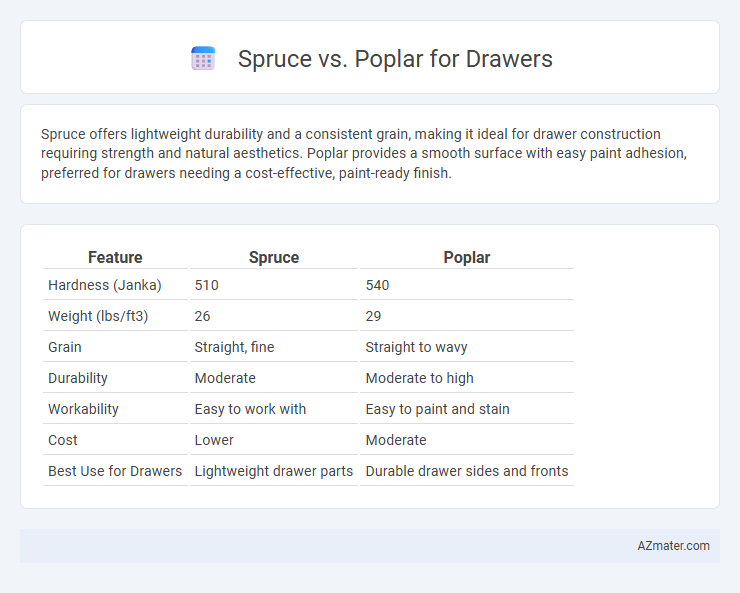Spruce offers lightweight durability and a consistent grain, making it ideal for drawer construction requiring strength and natural aesthetics. Poplar provides a smooth surface with easy paint adhesion, preferred for drawers needing a cost-effective, paint-ready finish.
Table of Comparison
| Feature | Spruce | Poplar |
|---|---|---|
| Hardness (Janka) | 510 | 540 |
| Weight (lbs/ft3) | 26 | 29 |
| Grain | Straight, fine | Straight to wavy |
| Durability | Moderate | Moderate to high |
| Workability | Easy to work with | Easy to paint and stain |
| Cost | Lower | Moderate |
| Best Use for Drawers | Lightweight drawer parts | Durable drawer sides and fronts |
Introduction to Spruce vs Poplar for Drawers
Spruce and poplar are two commonly used woods for drawer construction, each offering distinct characteristics in terms of durability and appearance. Spruce is a softwood known for its light color, straight grain, and affordability, making it suitable for lightweight drawer frames and simple designs. Poplar, a hardwood, provides greater strength, a smoother finish, and better resistance to wear, ideal for drawers requiring sturdiness and a refined look.
Wood Grain and Appearance Comparison
Spruce wood features a straight, fine grain with a pale, creamy white color that often displays occasional knots, lending a rustic feel to drawers. Poplar has a more varied grain pattern with subtle streaks of green, yellow, or brown, offering a smoother and more uniform appearance suitable for painted or stained finishes. When comparing drawer aesthetics, spruce provides a natural, textured look while poplar offers versatility and a cleaner, more consistent surface.
Strength and Durability Factors
Spruce is valued for its lightweight strength and consistent grain, making it moderately durable but more prone to dents compared to harder woods. Poplar, denser and stronger, offers greater resistance to wear and tear, which enhances the overall durability of drawers subjected to frequent use. When choosing between the two, poplar is often preferred for drawer construction where longevity and strength are critical factors.
Workability and Ease of Use
Spruce offers excellent workability with a lightweight, soft texture that cuts and shapes easily, making it ideal for intricate drawer details. Poplar provides superior ease of use due to its smooth grain and uniform density, which sands well and accepts paints and stains evenly, ensuring a flawless finish. Both woods are favored for drawer construction, but spruce excels in carving detail, while poplar simplifies finishing processes.
Cost Differences: Spruce vs Poplar
Spruce is generally more affordable than poplar, making it a popular choice for budget-conscious drawer construction. While poplar tends to have a higher cost due to its smooth finish and superior workability, it offers better durability and resistance to dents. Choosing spruce can significantly reduce material expenses, but poplar's higher price reflects its enhanced quality and longevity in drawer applications.
Weight and Density Considerations
Spruce is significantly lighter than poplar, with a density around 400 kg/m3 compared to poplar's density of approximately 450-500 kg/m3, making spruce ideal for lightweight drawer construction. Poplar offers greater density and strength, which enhances drawer durability and resistance to wear, especially in heavy-use applications. Choosing between spruce and poplar depends on the balance between the desired lightweight feel and the need for density to withstand daily drawer use.
Environmental Impact and Sustainability
Spruce is a rapidly renewable softwood with lower carbon emissions during harvesting and processing compared to poplar, making it more environmentally friendly. Poplar, while fast-growing and widely available, often requires more chemical treatments to enhance durability, which can increase its environmental footprint. Both woods are biodegradable and recyclable, but spruce's natural resistance to pests reduces the need for harmful preservatives, supporting greater sustainability in drawer construction.
Finishing and Paintability Qualities
Spruce wood offers a smooth grain that absorbs paint evenly, resulting in a consistent finish ideal for intricate drawer designs. Poplar features a fine, uniform texture with excellent paint adhesion, reducing the likelihood of blotching and providing a durable, vibrant color. Both woods respond well to primers, but Poplar's tighter grain structure generally allows for a cleaner, more polished painted surface in cabinetry applications.
Best Use Cases for Spruce and Poplar Drawers
Spruce is ideal for drawer construction where lightweight strength and fine finish are priorities, making it perfect for cabinetry that requires easy handling and smooth painting or staining. Poplar excels in applications demanding durability and resistance to dents, well-suited for drawers exposed to frequent use and wear, especially in rustic or hidden storage pieces. Both woods work well in furniture, but spruce favors decorative, lightweight designs, while poplar supports heavy-duty, durable drawer solutions.
Final Recommendation: Which Wood to Choose?
Spruce offers a lightweight and cost-effective option for drawers but lacks durability compared to poplar, which provides superior strength and smoother finish for painting. Poplar is more resistant to dents and warping, making it ideal for long-lasting drawer construction and higher quality cabinetry. For a balance of durability, aesthetic appeal, and ease of finishing, poplar is the recommended wood choice for drawer projects.

Infographic: Spruce vs Poplar for Drawer
 azmater.com
azmater.com